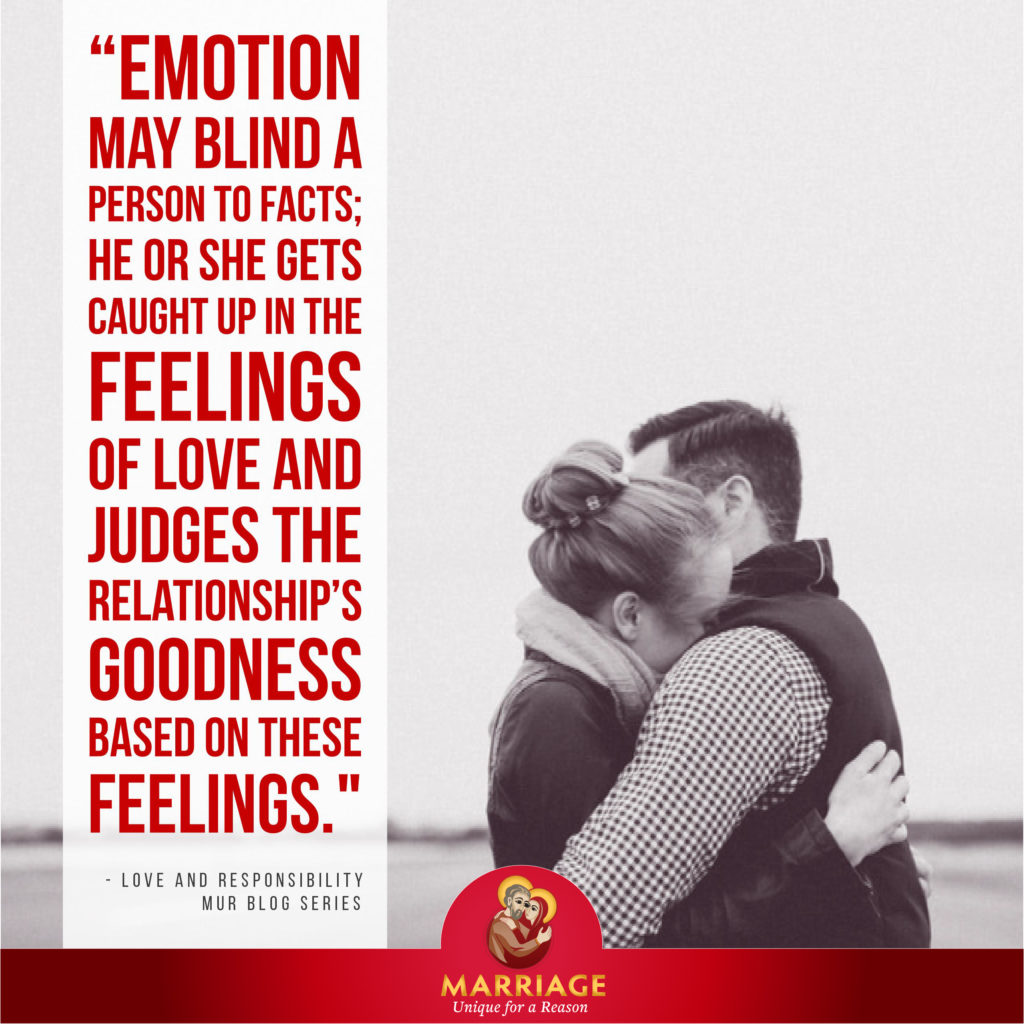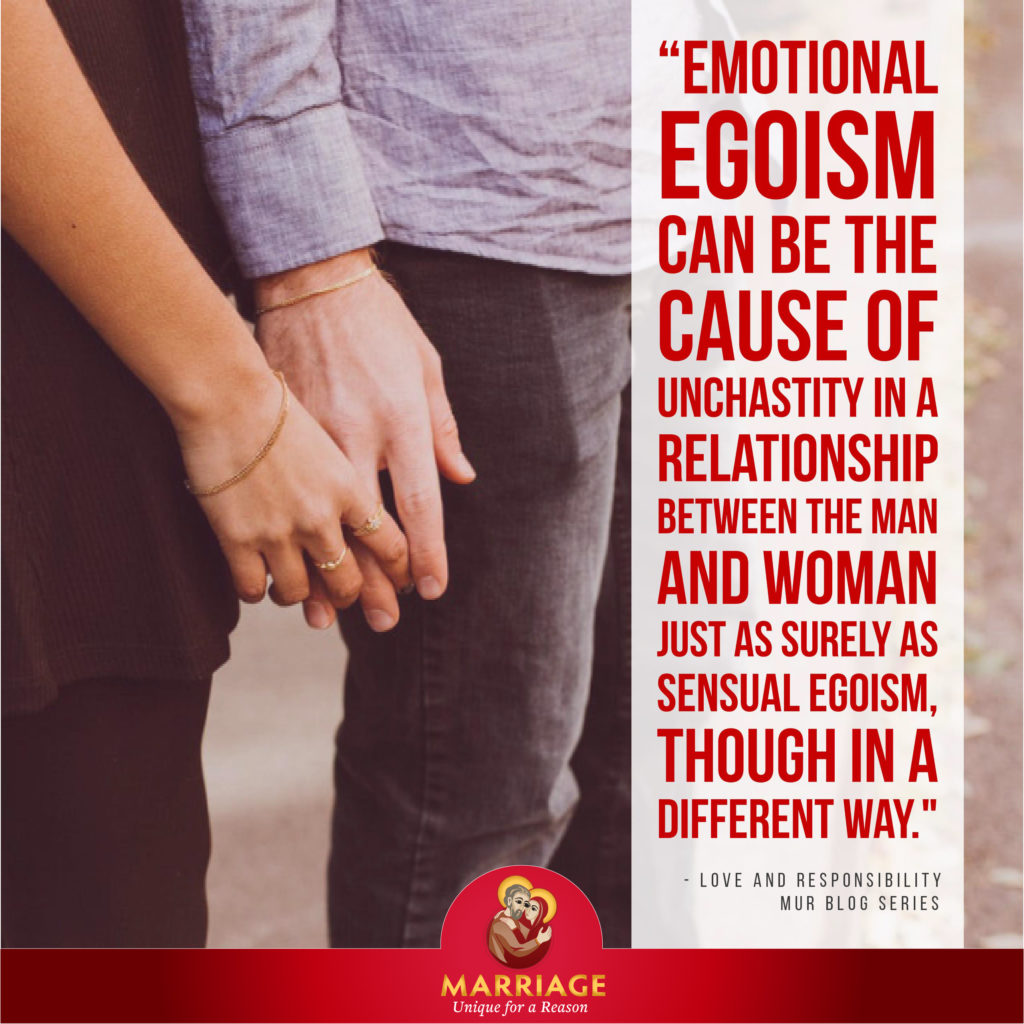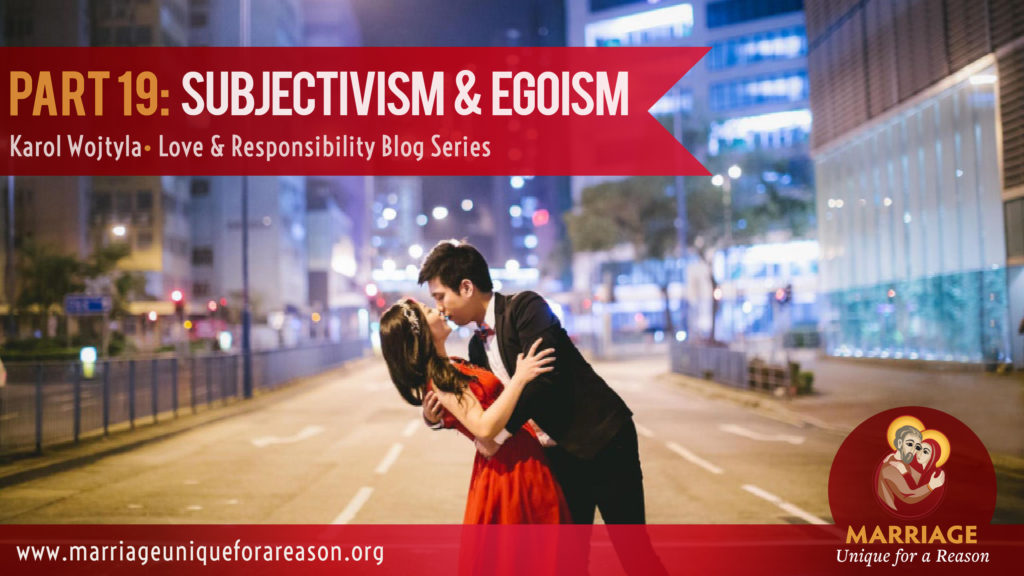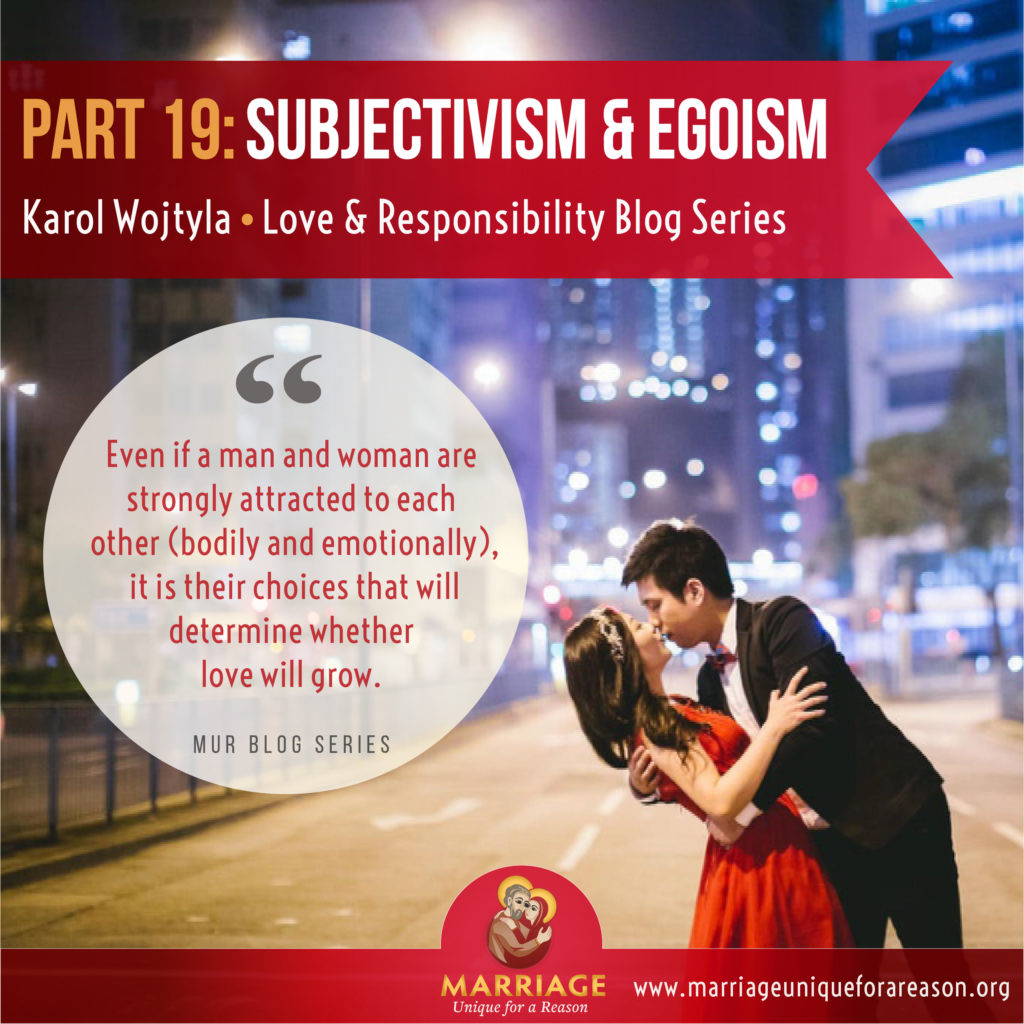Choice Determine Love, not Emotions:
“Emotion can develop and adapt itself to the shape which a man consciously wills”[i] Wojtyla writes at the beginning of the next section of Love and Responsibility. Human beings can mold their feelings, gradually, by conscious thoughts and choices. If you’ve ever gone to therapy, you’ve experienced this: thinking about something differently changes how you feel about it. “The integration of love requires the individual consciously and by acts of the will to impose a shape on all the material that sensual and emotional reactions provide.”[ii] So even if a man and woman are strongly attracted to each other (bodily and emotionally), it is their choices that will determine whether love will grow.
Wojtyla makes a  quick distinction here. Subjectivity is just a fact of human life and experience. A person experiences the world from the “inside,” i.e. with one’s distinct point of view. Subjectivism is when subjectivity is raised up as the only or the highest criteria by which to evaluate love. In other words, as long as two people feel in love, that’s all that matters. While it’s absurd, Wojtyla says, to think of love without emotion, it is equally absurd to reduce it to emotion alone. In fact, “emotion has its dangers,” he writes, and “may affect one’s apprehension of the truth.”[iii] Emotion may blind a person to facts; he or she gets caught up in the feelings of love and judges the relationship’s goodness based on these feelings. When this happens, Wojtyla warns that emotion may be detached from realty (“He’s so wonderful… okay, he hit me that one time, but…”), and the objective rules of behavior may be replaced by “authenticity” (i.e. since we really love each other, we can have sex even though we’re not married yet). “Genuine emotion,” writes Wojtyla, “may inform an act which objectively is not good.”[iv] When it comes to the relationship of man and woman, true and strong (and good!) feelings can lead to actions that are not truly loving. They do not correspond to the value of the person and their ultimate happiness. Just because it “feels right” doesn’t mean it is right. This is what Wojtyla means by the subjectivism of values. “Pleasure becomes the only value, and the only scale by which we measure values.”[v] It is not hard to imagine what would happen in a world where everyone just looked for pleasure at the expense of everything else. It ain’t pretty.
quick distinction here. Subjectivity is just a fact of human life and experience. A person experiences the world from the “inside,” i.e. with one’s distinct point of view. Subjectivism is when subjectivity is raised up as the only or the highest criteria by which to evaluate love. In other words, as long as two people feel in love, that’s all that matters. While it’s absurd, Wojtyla says, to think of love without emotion, it is equally absurd to reduce it to emotion alone. In fact, “emotion has its dangers,” he writes, and “may affect one’s apprehension of the truth.”[iii] Emotion may blind a person to facts; he or she gets caught up in the feelings of love and judges the relationship’s goodness based on these feelings. When this happens, Wojtyla warns that emotion may be detached from realty (“He’s so wonderful… okay, he hit me that one time, but…”), and the objective rules of behavior may be replaced by “authenticity” (i.e. since we really love each other, we can have sex even though we’re not married yet). “Genuine emotion,” writes Wojtyla, “may inform an act which objectively is not good.”[iv] When it comes to the relationship of man and woman, true and strong (and good!) feelings can lead to actions that are not truly loving. They do not correspond to the value of the person and their ultimate happiness. Just because it “feels right” doesn’t mean it is right. This is what Wojtyla means by the subjectivism of values. “Pleasure becomes the only value, and the only scale by which we measure values.”[v] It is not hard to imagine what would happen in a world where everyone just looked for pleasure at the expense of everything else. It ain’t pretty.
How Egoism Grows:
This is how egoism grows in a relationship, Wojtyla writes. An egoist only cares about himself or herself, and this means that an egoist cannot love. The crazy thing is that, as Wojtyla points out, there can be a “bilateral accommodation between egoisms,” because egoism “permits calculation and compromise,”  even while it excludes love.[vi] So there could easily be a relationship that looks pretty good from the outside but is really still based on two egoisms: two people who are both self-centered but want to be “in a relationship” enough to make certain concessions. Pleasure is really the only goal of each of them, whether sensual or emotional. Perhaps surprisingly, Wojtyla notes that, “Emotional egoism can be the cause of unchastity in a relationship between the man and woman just as surely as sensual egoism, though in a different way.”[vii] (The book Emotional Virtue touches on this!)
even while it excludes love.[vi] So there could easily be a relationship that looks pretty good from the outside but is really still based on two egoisms: two people who are both self-centered but want to be “in a relationship” enough to make certain concessions. Pleasure is really the only goal of each of them, whether sensual or emotional. Perhaps surprisingly, Wojtyla notes that, “Emotional egoism can be the cause of unchastity in a relationship between the man and woman just as surely as sensual egoism, though in a different way.”[vii] (The book Emotional Virtue touches on this!)
Wojtyla ends this section with an exhortation to always seek to integrate the objective and subjective sides of love, even though this takes “special effort.”[viii]
[i] Wojtyla, Karol. Love and Responsibility (San Francisco: Ignatius Press, 1993), p. 153.
[ii] Ibid, p. 153.
[iii] Ibid, p. 154.
[iv] Ibid, p. 154.
[v] Ibid, p. 155.
[vi] Ibid, p. 157.
[vii] Ibid, p. 158.
[viii] Ibid, p. 158.


Leave a Reply